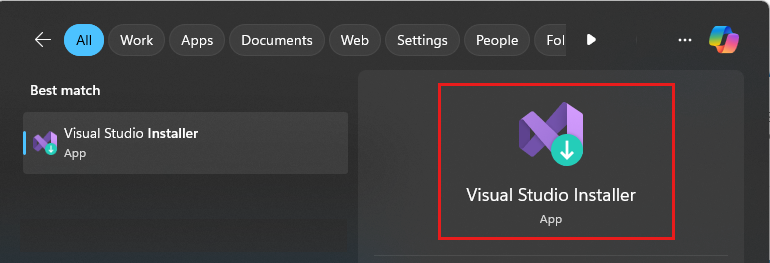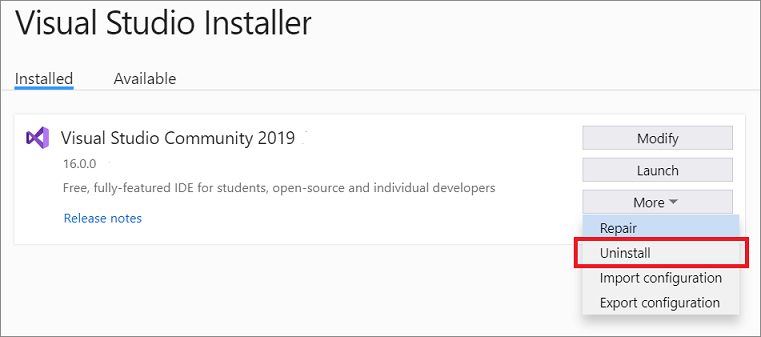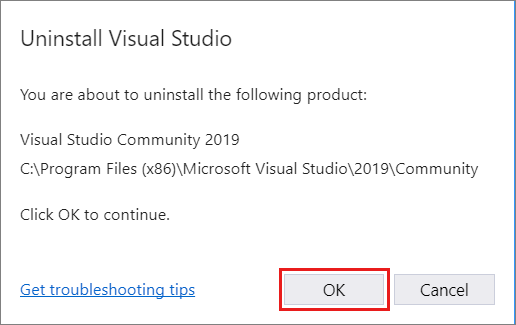Uninstall or remove Visual Studio
This page walks you through uninstalling Visual Studio, the integrated suite of productivity tools for developers.
Tip
If you're having trouble with your instance of Visual Studio, try the Repair Visual Studio tool.
To change the location for some of your Visual Studio files, it's possible to do so without uninstalling your current instance as described in Select the installation locations.
Uninstall by using Visual Studio Installer
Visual Studio Installer can uninstall versions of Visual Studio.
Find the Visual Studio Installer on your computer.
In the Windows Start menu, you can search for installer.

Note
You can also find the Visual Studio Installer in the following location:
C:\Program Files (x86)\Microsoft Visual Studio\Installer\setup.exe
You might have to update the installer before you continue. If so, follow the prompts.
In the installer, look for the edition of Visual Studio that you installed. Next, choose More, and then choose Uninstall.

Select OK to confirm your choice.

If you change your mind later and want to reinstall Visual Studio 2019, start the Visual Studio Installer again, choose the Available tab, choose the edition of Visual Studio that you want to install, and then select Install.
Find the Visual Studio Installer on your computer.
In the Windows Start menu, you can search for installer.

Note
You can also find the Visual Studio Installer in the following location:
C:\Program Files (x86)\Microsoft Visual Studio\Installer\setup.exe
You might have to update the installer before you continue. If so, follow the prompts.
In the installer, look for the edition of Visual Studio that you installed. Next, choose More, and then choose Uninstall.

Select OK to confirm your choice.

If you change your mind later and want to reinstall 2022, start the Visual Studio Installer again, choose the Available tab, choose the edition of Visual Studio that you want to install, and then select Install.
Uninstall Visual Studio
To remove all installations of Visual Studio 2019, and the Visual Studio Installer from your machine, uninstall it from Installed apps.
- In Windows 10 or later, type Add or remove programs in the Windows search box.
- Find Visual Studio 2019.
- Choose Uninstall.
- Then, find Microsoft Visual Studio Installer.
- Choose Uninstall.
To remove all installations of Visual Studio 2022, and the Visual Studio Installer from your machine, uninstall it from Installed apps.
- In Windows 10 or later, type Add or remove programs in the Windows search box.
- Find Visual Studio 2022.
- Choose Uninstall.
- Then, find Microsoft Visual Studio Installer.
- Choose Uninstall.
Remove all with InstallCleanup.exe
If you experience a catastrophic error and can't repair or uninstall Visual Studio, you can run the InstallCleanup.exe tool to remove installation files and product information for all installed instances of Visual Studio 2017, Visual Studio 2019, or Visual Studio 2022.
Warning
Use the InstallCleanup tool only as a last resort if repair or uninstall fail. This tool might uninstall features from other Visual Studio installations or other products, which you then might need to repair or reinstall.
Here's how to run the InstallCleanup.exe tool:
Close the Visual Studio Installer.
Open an administrator command prompt. To open an administrator command prompt, follow these steps:
- Type cmd in the Windows search box.
- Right-click Command Prompt, and then choose Run as administrator.
Enter the full path of the InstallCleanup.exe tool and add the command-line parameters that you prefer. By default, the path of the tool is as follows. The double quotes enclose a command that contains spaces:
"C:\Program Files (x86)\Microsoft Visual Studio\Installer\InstallCleanup.exe"Note
The Visual Studio Installer directory is always located at %ProgramFiles(x86)%\Microsoft Visual Studio. If you can't find InstallCleanup.exe there, follow the instructions to install Visual Studio. Then, when the workload selection screen is displayed, close the window and follow the steps in this section again.
These options are available:
Parameter Behavior -i [version]If you don't specify a value, uses the default version. Removes only the main installation directory and product information. Use this parameter if you intend to reinstall the same version of Visual Studio. If you specify a [version]value, the tool removes only products with a version that start with this string value. For example, use the value -i 17 with to remove all products of version 17.-fRemoves the main installation directory, product information, and most other features installed outside the installation directory that might also be shared with other Visual Studio installations or other products. Use this parameter if you intend to remove Visual Studio without reinstalling it later.
Support or troubleshooting
Sometimes, things can go wrong. If your Visual Studio installation fails, see Troubleshoot Visual Studio installation and upgrade issues for step-by-step guidance.
Here are a few more support options:
- We offer an installation chat (English only) support option for installation-related issues.
- Report product issues to us via the Report a Problem tool that appears both in the Visual Studio Installer and in the Visual Studio IDE. If you're an IT Administrator and don't have Visual Studio installed, you can submit IT Admin feedback here.
- Suggest a feature, track product issues, and find answers in the Visual Studio Developer Community.
Related content
Visszajelzés
Hamarosan elérhető: 2024-ben fokozatosan kivezetjük a GitHub-problémákat a tartalom visszajelzési mechanizmusaként, és lecseréljük egy új visszajelzési rendszerre. További információ: https://aka.ms/ContentUserFeedback.
Visszajelzés küldése és megtekintése a következőhöz: